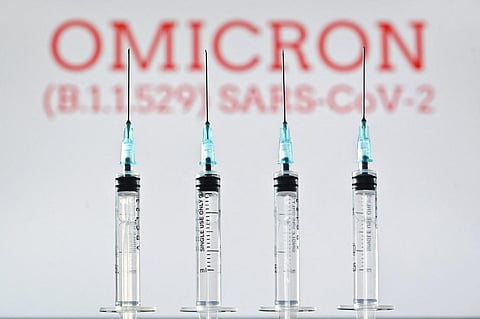

NEW DELHI: The Centre has advised the States and Union Territories (UTs) to not let their guard down and maintain their preparedness for fighting COVID19 (and its variants) in view of the new variant Omicron (designated as a Variant of Concern by WHO on November 26, 2021).
Union Health Secretary Rajesh Bhushan reviewed the public health preparedness of the States for fighting COVID19 and the Omicron variant along with the progress of vaccination with Health Secretaries and National Health Mission (NHM) MDs of States and UTs, through video conference (VC) on Thursday.
He highlighted the trajectory of COVID and brought attention to emerging evidence on the Omicron variant of COVID-19 driving the growing number of cases worldwide, a statement said.
Rajesh Bhushan reiterated that local containment measures are to be put in place by the district and local administration when either the test positivity increases beyond 10 per cent or occupancy of oxygenated beds increases beyond 40 per cent.
However, based on the local situation and population characteristics such as density etc., and keeping in mind the higher transmissibility of Omicron, the states and UTs can undertake containment measures and impose restrictions even before these thresholds are reached.
Any restriction must be enforced for a minimum of 14 days, the States were advised. As syndromes of the Omicron variant closely mimic common cold with a higher rate of transmissibility and doubling time, a syndromic approach for COVID containment can be employed.
A five-fold strategy suggested by the Centre for tackling the recent ‘Omicron’ threat was re-emphasised on Thursday which includes imposing night curfews and ensuring strict regulation of large gatherings, especially ahead of the forthcoming festivities.
On Testing and Surveillance, States were asked to keep a close and strict watch on the number of Delta and Omicron cases in all districts; case positivity on a day-on-day and week-on-week basis; the doubling rate; and new emerging clusters and initiate containment in these areas.
In addition, the Centre suggested attention to conduct tests as per extant ICMR and MoHFW guidelines
and ensure door-to-door case search in the containment areas, utilize the access to “AIR SUVIDHA” Portal to monitor the international passengers.
On Clinical management, States were informed that the existing National Clinical Management Protocol remains unchanged for Omicron. They were advised to, increase bed capacity, ensure logistics like ambulances and enforce mechanisms for seamless shifting of patients. Ensure operational readiness of oxygen equipment. Maintain buffer stock of essential medicines of at least 30 days. Utilize funds sanctioned under the Emergency COVID Response Package (ECRP-II) to ensure that the requisite capacity of health systems is developed at/near hotspots to respond to any emergency.
On COVID Safe Behaviour, states were advised to, ensure advance engagement and information so that there is no misinformation or panic, communicate transparently on hospital and testing infrastructure availability, conduct regular press briefings. Encourage community participation and strict enforcement of Covid Appropriate Behaviour.
Regarding Vaccination, States were advised to ensure 100% coverage of left out first and second dose eligible beneficiaries in an accelerated manner. Give special focus to those districts where the first & second dose coverage is less than the national average. The Centre asked the States going in for elections in the near future to exponentially ramp up the vaccination, especially in the low coverage districts to protect the vulnerable population.
Since pockets with low vaccination coverage and those with low COVID exposure may be more vulnerable to the new Omicron variant, states were asked to accord special attention to ramp up vaccination in these pockets.